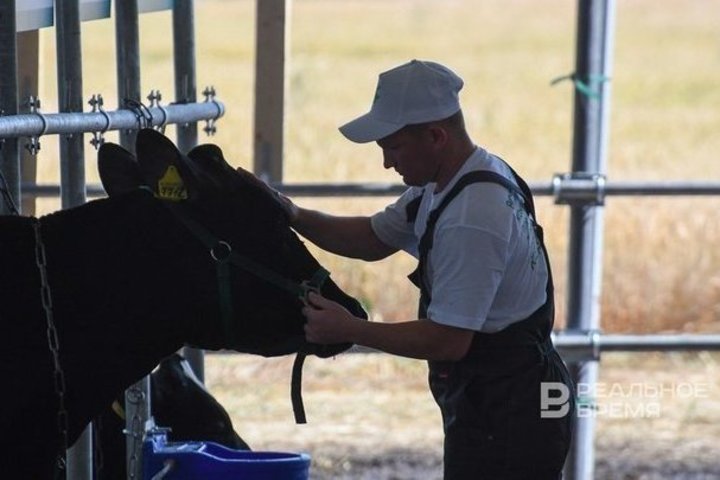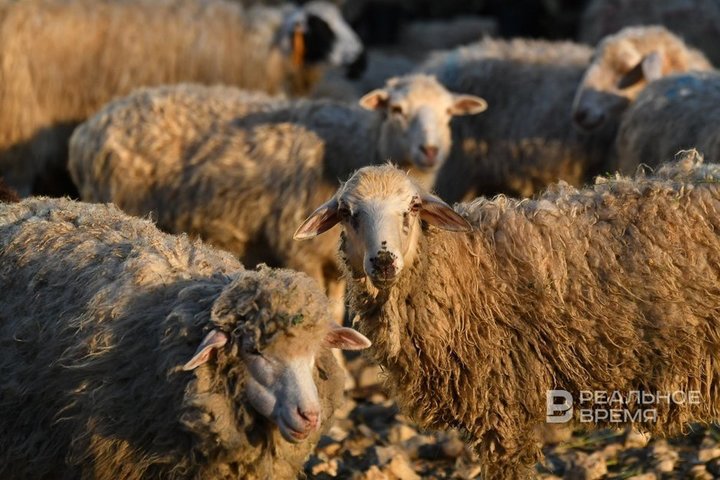Cattle-keeping enterprises advised to switch to a closed operation in Tatarstan
Main Veterinary Department of the Cabinet of Ministers of the Republic of Tatarstan and the Rosselkhoznadzor Administration for the republic have summed up the results of 2024

“In 2025, we will start digitising the sampling process for research”
The Main Veterinary Department of the Cabinet of Ministers of the Republic of Tatarstan in 2024 marked large and small cattle, horses, pigs and poultry by September 1, although work could be carried out until 2025. This was announced today at a press conference by Almaz Khisamutdinov, Head of the Main Veterinary Department of the Cabinet of Ministers of Tatarstan, summing up the work of the department in 2024.
He noted that the agency had to sue some farmers. For example, there was a similar incident in the Pestrechinsky district. The court ruled in favour of the General Veterinary Administration, and the farmer had to chip the animals.
“During 2025, we will begin digitising the sampling process for research by linking the animal's number to a barcode. All our vaccinations will also be transferred to the electronic platform. The events will be displayed in the REGAGRO information system with further integration into the Horriot system," Almaz Khisamutdinov shared his plans.

As for laboratory diagnostic work, more than 5.3 million studies were conducted last year. In 2024, there were 40 laboratories in the republic, but since January 1, two of them — in Kamsko-Ustinsky and Cheremshansky districts — have stopped working. They decided to close them due to the lack of livestock. In addition, there are 33 veterinary expertise departments in Tatarstan in the markets, and 31 — in state veterinary associations. Such specialists also work at 61 slaughterhouses. In total, about 75 million product safety control examinations were conducted.
“We are very actively engaged in feed laboratories. There are toxicology departments in all regions of the republic that can examine the feed. More expanded [institutions] are in Aktanyshsky, Tukayevsky, Atninsky, Baltasinsky districts. In 2025, we plan to open separate branches of the republican veterinary laboratory in the Sabinsky district to study the full feed cycle," the speaker added.
He also recalled that on January 1, a decree of the Cabinet of Ministers of the Republic of Tatarstan on mandatory registration of dogs came into force in Tatarstan. The animals will be marked using electronic chips with a unique number. The animal must be registered within three months from the date of birth. Owners will be able to chip dogs in both public and private clinics.

“It is possible to install the chip in public and private clinics. We will provide information about the dog in the Horriot system...> If your dog is chipped, you can submit information through Gosuslugi," Khisamutdinov emphasised.
“We have managed to achieve a 20% provision of biological protection for our livestock enterprises, which is very small”
The situation of particularly dangerous quarantine diseases in Tatarstan is relatively safe, the speaker said. In particular, not a single case of African swine fever has been reported for two years. At the same time, there has been a sharp decline in the scale of wild boar culling, which is the primary carrier of this disease.
"3,499 heads were shot in 2022, 2,410 in 2023, and 1,258 in 2024. This is almost two times lower than in 2023," he complained and expressed hope that the situation would improve in the new year.
The head of the department recalled that in 2024, four foci of brucellosis were identified in Tatarstan:
- in the private sector of the village of Starye Chechkaby in the Kaibitsky district;
- in the Gariev farm near the village of Priboy, Zelenodolsk district;
- in the private sector of Saraily village, Sarmanovsky district;
- in Khabibullin IP, the village of Bikchuraevo, Rybno-Slobodsky district.

To date, restrictions have already been lifted in three cases, and final measures are being carried out at Khabibullin IP. All cases are imported, the speaker stressed. As part of the preventive work, about 1.4 million heads of large and more than 75,000 small cattle, over 21,000 horses, and about 23,000 pigs were examined. The heads of cattle-keeping enterprises were advised to provide the population with calves, as well as meat at a lower-than-market price, in order to resist unauthorised import of livestock.
Officially, Tatarstan received in 2024:
- 34,111 heads of cattle, of which 760 are from Hungary, Latvia, Czech Republic;
- 166,816 pigs;
- more than 5.8 million birds.
The speaker stressed that the time has come for cattle-keeping enterprises to switch to a closed maintenance regime. According to him, pig and poultry farms have done this for a long time.

“Not all managers understand the importance of this issue yet. Over the past year, we have managed to achieve a 20% provision of biological protection for our livestock enterprises. It's very small. “We will continue to address this issue this year as well. A very strict directive was given by our Deputy Prime Minister on this matter," stated Almaz Khisamutdinov.
117,000 tonnes of grain were exported from Tatarstan to 21 countries
According to Ilnur Galeev, the head of the Rosselkhoznadzor Administration for the Republic of Tatarstan, the sale of livestock on one of the free classifieds sites and other electronic platforms has become an urgent problem.
“The strengthening of preventive work with them continues. We call, find out where the cattle are being transported from, by whom, and what documents are available. This is a thankless job because people on the phone often don't introduce themselves and sometimes just hang up," he lamented, urging Tatarstan residents to be attentive and carefully weigh the risks of spreading infectious diseases.

The speaker stressed that work is also underway to counteract the production and sale of low-quality counterfeit products. In 2024, more than 600 samples were collected in hospitals and kindergartens. About 9.5% of the materials did not meet the quality standards.
“In 2024, about 117,000 tonnes of grain were exported to 21 countries of the world under the control of the department. It should be noted that work is actively underway to certify products in China: 3,500 tonnes were shipped, which is by 40% more than the year before last. In addition, wheat for 2,000 tonnes was shipped for the first time," Galeev also said.